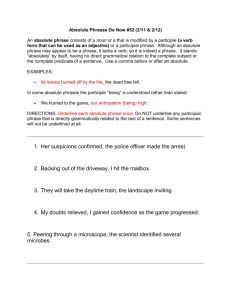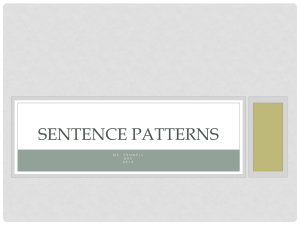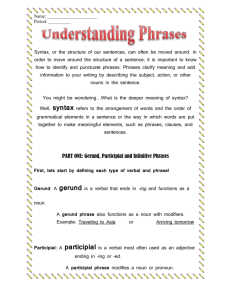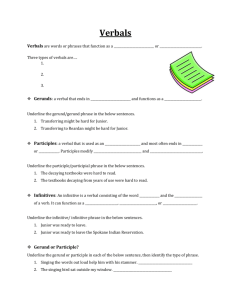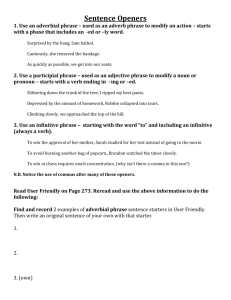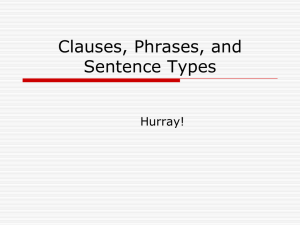Types of Phrases and Clauses
advertisement
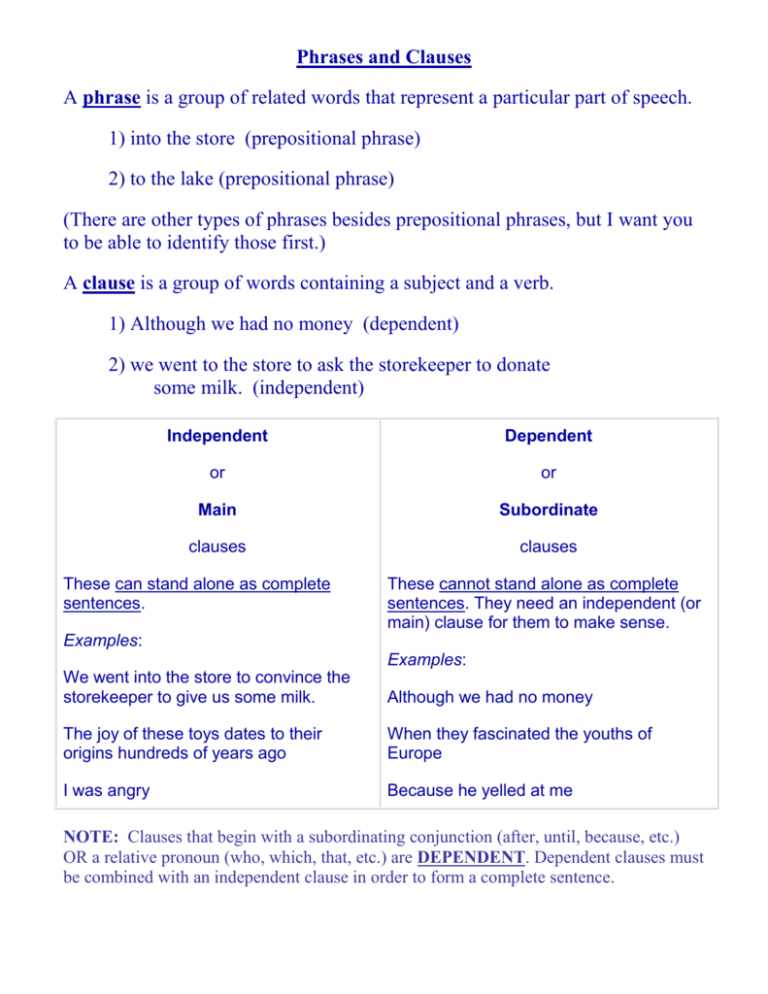
Phrases and Clauses A phrase is a group of related words that represent a particular part of speech. 1) into the store (prepositional phrase) 2) to the lake (prepositional phrase) (There are other types of phrases besides prepositional phrases, but I want you to be able to identify those first.) A clause is a group of words containing a subject and a verb. 1) Although we had no money (dependent) 2) we went to the store to ask the storekeeper to donate some milk. (independent) Independent Dependent or or Main Subordinate clauses clauses These can stand alone as complete sentences. These cannot stand alone as complete sentences. They need an independent (or main) clause for them to make sense. Examples: Examples: We went into the store to convince the storekeeper to give us some milk. Although we had no money The joy of these toys dates to their origins hundreds of years ago When they fascinated the youths of Europe I was angry Because he yelled at me NOTE: Clauses that begin with a subordinating conjunction (after, until, because, etc.) OR a relative pronoun (who, which, that, etc.) are DEPENDENT. Dependent clauses must be combined with an independent clause in order to form a complete sentence. Types of Clauses Dependent clauses can be identified and classified according to their role in the sentence. Noun clauses do anything that a noun can do. They can be subjects, objects, and objects of prepositions. They answer the question “what?” • What Turveydrop has forgotten about American politics could fill entire libraries. • President Johnson finally revealed what he had in mind for his congressional leaders. • Sheila Thistlethwaite has written a marvelous book about how American politics and economic processes often run counter to common sense. ADVERB CLAUSES tend to tell us something about the sentence’s main verb: when, why, under what conditions. • After Jubal Early invaded the outskirts of Washington, Congressional leaders took the southern threat more seriously. • Lincoln insisted on attending the theater that night because it was important to demonstrate domestic tranquility. ADJECTIVE CLAUSES modify nouns or pronouns in the rest of the sentence. They tell what kind or which one. • The Internet, which started out as a means for military and academic types to share documents, has become a household necessity. • Tim Berners-Lee, who developed the World Wide Web, could never have foreseen the popularity of his invention. • The graphical user interface (GUI) that we all take for granted nowadays is actually a late development in the World Wide Web. Notice, now, how the subject is often separated from its verb by information represented by the dependent clause. Practice: For the underlined clause in each sentence, indicate whether it functions as a noun, adjective, or adverb. 1. Buford High school, which is an award-winning school, moved to AAA this year. _____________ 2. Even though he said he was sorry, I cannot forgive him. _____________ 3. Lately, I have realized that I am a jealous person. _____________ 4. Before I tell you my secret, you have to promise not to tell anyone. _____________ 5. What my opinion is on this matter isn’t what is important. _____________ Types of Phrases: Cheat Sheet Type of Phrase Used as (part of speech) Definition Examples Prepositional Adjective or adverb Prepositional phrases start with a preposition and end with a noun (the object). Prepositional phrases function as adjectives, adverbs, or nouns. A noun phrase is a group of words consisting of a noun and any words that modify that noun. An appositive is a noun or pronoun which gives additional information about another noun or pronoun. It is set apart from the rest of the sentence by commas. Participial phrases are formed from participles and all the related words. Participles are formed from verbs and end in "ing" or "ed." Participles function as adjectives; therefore, participial phrases also function as adjectives. They often describe the subject of the sentence. A gerund phrase is formed from a gerund plus its related words. A gerund is a verb with an "ing" ending that functions as a noun. An infinitive phrase is formed from an infinitive and other related words. An infinitive is the word "to" followed by a verb. This type of phrase functions as a noun, an adjective, or an adverb. Yesterday, I ran by the lake. (adverb) Noun Noun (Noun) Appositive Adjective (Verbal) Participial Adjective (Verbal) Gerund Noun (Verbal) Infinitive Noun, adjective, or adverb The house by the lake is very large. (adjective) The very tall man had a hard time finding clothes that fit well. Mrs. McClure, my teacher, wants me to learn about phrases. Eating slowly, the child was finally quiet. Competing successfully requires much practice. To sleep late on Sundays is a big treat! Practice: IDENTIFY TYPES OF PREPOSITIONAL PHRASES Underline the prepositional phrase in each sentence. Circle the word or words that it modifies. Then, in the blank, write ADJ or ADV to identify what kind of prepositional phrase it is. 1. Early phonograph records of Enrico Caruso are valuable today. 2. Computer animation produces special effects for many films. 3. Frank Lloyd Wright turned against traditional architectural styles. 4. Sculptures can be created from clay, wood, stone, plaster, or metal. 5. Artist George O’Keefe began painting the sky and clouds after an airplane ride Practice: IDENTIFYING APPOSITIVE PHRASES Underline the appositive phrase in each sentence. Circle the noun it identifies. Add necessary commas. 6. Swiss scientist Jacques Piccard is an oceanographic engineer. 7. His father Auguste Piccard designed the bathyscaphe. 8. In 1953, the two Piccards descended 10,300 feet under the Mediterranean Sea in the submarine Trieste. 9. The Great Barrier Reef a chain of coral reefs is located of the northeastern coast of Australia. 10. The coral is formed by polyps hardened skeletons of flowerlike water animals. Practice: IDENTIFYING PARTICIPIAL PHRASES In each sentence, find and underline the participial phrase that modifies the boldfaced noun or pronoun. 11. Writing quickly, the students took the exam 12. The travelers saw a huge stone castle perched on the rocky cliff. 13. The boy performing a solo on the trumpet is my brother. 14. Swimming with his friend, Frances made it to the float. 15. Ed’s sailboat, damaged near the stern, was unusable. Practice: IDENTIFYING GERUNDS In each sentence, underline every gerund phrase. Circle the gerund. 16. Speeding down mountain slopes thrills many skiers. 17. Cross-country style identifies hiking on skis over snow-covered ground. 18. Norwegian immigrants introduced skiing into the United States in the mid-1800s. 19. Almost every ski area in the United States has machines for making snow. 20. Ski areas also have ski lifts, devices for transporting skiers to the tops of slops. Practice: IDENTIFYING INFINITIVE PHRASES In each sentence, underline the infinitive phrase. Circle the infinitive. 21. The tourists asked the bus driver to go slower. 22. Their purpose for taking the tour was to see the countryside. 23. The earliest attempts to fly ended in embarrassment, if not injury. 24. Robert’s plan to compete in a triathlon surprised everyone. 25. Yes, we packed supplies – enough to last a full week. More Practice: Identify the correct choice in each question and click on the to see whether your answer is correct. 1. Marta fell over the cat. a. infinitive phrase b. appositive c. gerund phrase d. prepositional phrase e. clause f. participial phrase e. clause f. participial phrase 2. Pretending to be asleep, the hiker escaped the bear. a. infinitive phrase b. appositive c. gerund phrase d. prepositional phrase 3. Susan Sarandon, a famous actress, has been very supportive of the striking workers. a. infinitive phrase b. appositive c. gerund phrase d. prepositional phrase e. clause f. participial phrase e. clause f. participial phrase e. clause f. participial phrase 4. To finish the marathon in less than five hours is Tom's goal. a. infinitive phrase b. appositive c. gerund phrase d. prepositional phrase 5. She preferred eating at the local deli for lunch. a. infinitive phrase b. appositive c. gerund phrase d. prepositional phrase 6. He should discover a gift certificate for dinner at Cafe Sofia under his seat at the table. a. infinitive phrase b. appositive c. gerund phrase d. prepositional phrase e. clause f. participial phrase e. clause f. participial phrase 7. After learning the parts of speech, the class began studying punctuation. a. infinitive phrase b. appositive c. gerund phrase d. prepositional phrase 8. The candidate elected by the voters promised to put "a chicken in every pot." a. infinitive phrase b. appositive c. gerund phrase d. prepositional phrase e. clause f. participial phrase 9. Will someone be here soon to open the door? a. infinitive phrase b. appositive c. gerund phrase d. prepositional phrase e. clause f. participial phrase e. clause f. participial phrase e. clause f. participial phrase e. clause f. participial phrase e. clause f. participial phrase 10. Delivering the pizza on time became his single mission. a. infinitive phrase b. appositive c. gerund phrase d. prepositional phrase 11. The woman who led the workshop used to be a math teacher. a. infinitive phrase b. appositive c. gerund phrase d. prepositional phrase 12. Frustrated with the delays, Erin tried to break her dog out of quarantine. a. infinitive phrase b. appositive c. gerund phrase d. prepositional phrase 13. Tom visited India while studying the history of Indian art. a. infinitive phrase b. appositive c. gerund phrase d. prepositional phrase 14. While she looked behind the house, the rest of us searched the local parks for the puppy. a. infinitive phrase b. appositive c. gerund phrase d. prepositional phrase e. clause f. participial phrase 15. Tom Hanks, star of "Philadelphia, will be appearing in a new film this holiday season. a. infinitive phrase b. appositive c. gerund phrase d. prepositional phrase e. clause f. participial phrase 16. Before putting too much effort into the project, maybe you should get some guidance from your boss. a. infinitive phrase b. appositive c. gerund phrase d. prepositional phrase e. clause f. participial phrase e. clause f. participial phrase e. clause f. participial phrase e. clause f. participial phrase e. clause f. participial phrase 17. The car that Devon sold to the dealership has been wrecked twice. a. infinitive phrase b. appositive c. gerund phrase d. prepositional phrase 18. Does the captain want us to lower the sails before we enter the harbor? a. infinitive phrase b. appositive c. gerund phrase d. prepositional phrase 19. She liked the shirt given to her by her grandmother. a. infinitive phrase b. appositive c. gerund phrase d. prepositional phrase 20. Did you really think that robbing a bank would solve your problems? a. infinitive phrase b. appositive c. gerund phrase d. prepositional phrase


